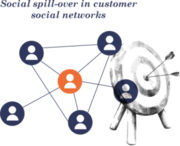As humans, we continually compare ourselves to our peers and those in close proximity. But, how does this natural propensity for social comparison effect how people behave at work? Tomasz Obloj says, “There is emphasis on increasing transparency in the modern workplace. There are many good reasons to do so, reduced discrimination being an important one. However, this can also lead to envy between employees with detrimental effects on productivity.”
Selfish comparisons at work
Obloj and Zenger wanted to find out what increases social comparison in the workplace and how this would influence a firm’s performance. Transparency can reduce discrimination and lead to a more even playing field at work, but it can also foster social comparison between co-workers. “People tend to compare themselves to others who are in close proximity,” Obloj explains. “This may be geographical proximity (those in the same office), structural proximity, (those in the same organizational unit), or social proximity (friends or colleagues).” He adds: “When we look at someone and compare ourselves to them, we decide if they are better or worse off than us. Those that are worse off might induce compassion, and those better off tend to induce envy.”
Transparency can reduce discrimination and lead to a more even playing field at work, but it can also foster social comparison between co-workers.
Studying envy in social comparison
Within an organization there are complex behavioral micro-mechanisms that can be difficult to untangle. An employee may envy another because their results are better, but what if the person who obtains better results simply works harder? “We were able to carry out an empirical investigation using data from a retail bank that had organized a tournament between its branches. Each branch was assigned to a tournament group where they competed for a different number of prizes: 1-4. If a branch happened to be allocated to a good tournament group, it had a higher probability of winning.” Group allocation was not based on skill or talent which meant that any element of envy or compassion observed in employees could be narrowed down to social comparison alone.
Isolating and analyzing the data on envy
In analyzing the data, Obloj used an instrumental approach to find contexts that would unambiguously allow him to identify objects of envy. “The data provided by the bank created a perfect quasi-laboratory,” he reports. With the data provided by the bank, Obloj followed an ‘insider econometrics’ approach using a combination of all the big data from the organization relating to individual bank branches, coupled with detailed information from employee interviews, emails and company memos. “This enabled me to understand what was going on inside the organization and interpret the data,” he explains. “In the context of this bank, we see an upward social comparison where employees focus on those that are more advantaged. They only pay attention to objects of envy and show no signs of compassion,” Obloj reports. “We also see that when objects of envy are more proximate (structurally, socially, or physically), individuals become demotivated and reduce the amount of effort they make at work.”
From a strategy perspective, Obloj concludes: “Organizations can use different levers to reduce the potentially harmful social comparison that we observe. They could make structural changes to their organization and alter the work culture to decrease the proximity of those likely to be affected by social comparison and become objects of envy.”








